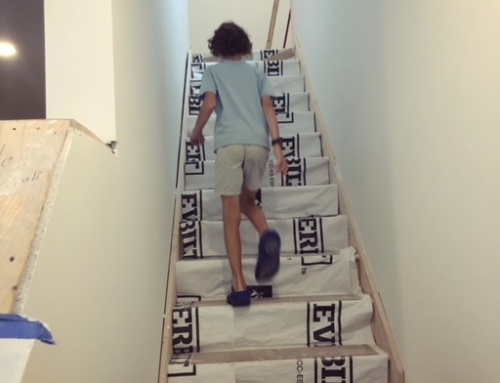Permits: One Way to Know You’ve Hired a Pro Remodeler
We are all tempted to purchase services and product based on price. But what does fixating on price vs value get you? Or NOT get you? Here is a story I hope will highlight what I mean by value from the perspective of permits on a project.
We are finishing a small bathroom renovation on a lovely large home in Mt. Airy. Of course we have proper permits to conduct this project. Our subcontractors have permits to do the electrical and plumbing work too. Each of these requires that fees be paid and applications be made. It’s a lot of leg work and money to make sure your project complies with code. Complying with code means it’s safe and will enhance your property and neighborhood. Permits mean value.
Typically, Tamara initiates the permit process for any project by going to L&I at the Municipal Services Building, where she presents a “permit set” of drawings for approval and pays a fee to process the request for a permit. Years of experience tell her what needs to be in the permit set to satisfy L&I. If needed, she can make small notes or additions to the drawings while she is meeting with the processor. Her skill saves the home owner time and money.
Typical permit turn around time is 4-6 weeks. After that time period, we get a faxed copy to our office saying our project may begin. We are assigned an inspector, a permit number, and a telephone number where we can stay in touch with our inspector. We are required to call at the start of demo, at the rough framing phase, at rough-in, when our subs install their pipes, ducts, and wires, and at “close.” Sometimes the inspector will want to return to see further details or that changes are made. We are required to call him when that detail is ready for him. Delays of inspections means the project slows down and we lose money. We aim to be very efficient and complete for our inspectors. We have a good reputation with them because of this.
At the close of the project, we contact our inspector to do a final inspection of the project. He comes in to see that all the subs have been inspected and that our work is to code and correct. Then he signs off on the project calling it “correct and closed.”
We get a faxed receipt for correct and closed at the office and the home owner gets one too. In fact, the home owner is copied by L&I on everything we get at the office related to their permit. We keep in your project files the entire permit records for each project. This permit record is a great value when you go to refinance or sell your home since it documents that your project is legal.
What I have outlined here is a project permitting process that went smoothly. Most of the time ours go smoothly, because we have great documents we prepare for L&I, because we have organized field staffers who can ask for inspectors’ help from their cell phones, and because our office staff and subs keep their permits organized. Sometimes permits and inspections don’t go smoothly. Usually it’s because someone in the string doesn’t know what they are doing or they drop the ball. This is why inspections and permits are not for the DIY or inexperienced. It can be very expensive for the contractor and the home owner if the permit process goes awry.
Over the past 3 weeks my carpenter on the site of this bathroom project has been unable to reach our inspector or his office for a final inspection. The phones were not being picked up. So my carpenter asked for help from the office. From our office we sent faxes and made phone calls. Still with no result. Today, I spent 1.5 hours on the phone with L&I trying to get some result. I got the run around for quite a while. My note pad had 20 phone numbers on it that I had been sent to. I was mad! FINALLY a man named Casey at L&I listened with me to the inspectors phone not being picked up. Then Casey sent an e-mail request for a final inspection to our inspector. Casey gave me a confirmation number as well. Thank you Casey for your help!
We don’t charge our customers more when we run into SNAFU’s like this one with L&I. We just take care of it for them. That’s what we are being paid for. Normally for us, L&I is smooth and trouble free.
Chances are that if you are hiring the cheaper contractor, he/she is going to attempt to manage the business end of things, the part that deals with paperwork, after work hours or on weekends. He or she may skip the permit all together because as you can see, it’s a lot of work to keep these organized. He or she probably doesn’t have the in-house design staff to produce the project drawings. Chances are you won’t be getting the professional, code compliant, service your project requires by law. So when you are tempted by low priced contractors or services, remember to think about value. Find out what you are NOT getting for your money. A good place to start asking questions is permits.





